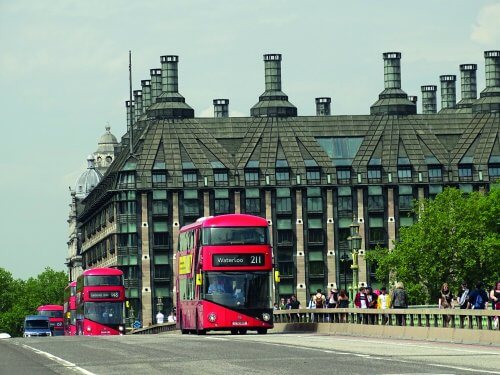New Routemaster buses are at risk of being removed from roads and the continued electrification of the capital’s bus fleet is under threat, with the date for a zero-emission fleet likely to slip till at least 2037
Mayor of London Sadiq Khan has outlined the ‘dire’ threat against tens of thousands of jobs across the country if the Government fails to provide the long-term and capital funding TfL needs.
TfL is dealing with an unprecedented financial crisis caused by the pandemic and with less than a month until the current funding deal from the Government expires, the Mayor has warned that if Ministers do not fund TfL properly, the repercussions will be felt all around the country.
London is said to be the ‘motor of the UK economy’ and its transport system of ‘huge importance’ if the capital is to drive the national recovery from the pandemic. London’s net contribution to the Treasury was £36 billion in the year before the pandemic, and TfL said its contracts contribute around £7bn to the UK economy while supporting 43,000 jobs around the country, with 55p of every pound spent on London Underground by TfL going outside of London.
If such projects cannot continue due to a lack of funding from the Government, the operator warned that tens of thousands of jobs will be at risk, many of which are likely to be outside of London. London’s bus manufacturing is said to support 3,000 jobs across the UK alone, including in Scarborough, Falkirk, Leeds and Ballymena, Northern Ireland, making up a third to half of all new bus orders in the UK in any given year. TfL has paused awarding new bus contracts since early November, and London bus operators only place vehicle orders when new contracts have been awarded, meaning the lack of a long-term funding deal is having an immediate impact on the order books for UK bus manufacturers.
The 1,000 New Routemaster buses, brought in by the previous Mayor and owned by TfL, are also currently due their mid-life refurbishment. If the Government fails to provide the funding required, TfL claims it may be unable to refurbish these buses and, along with potential bus service cuts under a managed decline scenario, said they may need to be removed from the roads, impacting the order pipeline for a range of bus manufacturers and specialists around the country.
In addition, TfL says that the continued electrification of the capital’s bus fleet would be under threat, with the date for a full zero-emission fleet likely to slip until at least 2037, from the current target of 2034. TfL believes that bus electrification in London is also encouraging other areas around the country to follow, and says that if orders for electric buses stop in London, not only will jobs be at risk, but progress towards electrification will slow nationally, increasing costs and losing the benefit for the entire country.
As well as key suppliers, TfL said it awards support work for around 3,000 small and medium sized enterprises (SMEs) in the UK. Many of these have very niche products and services and TfL can be a significant proportion of their turnover. SMEs account for three fifths of the employment and around half of turnover in the UK private sector, and their recovery and growth is seen as essential.
The Mayor said: “London’s transport system is not only fundamental to the success of the capital, but to driving economic prosperity right across the length and breadth of the country. That is why it is so important that the Government urgently comes forward with the long-term funding TfL desperately needs so we can keep services running and deliver much-needed improvements to our transport infrastructure. It is no exaggeration to say that tens of thousands of highly skilled jobs – many of which would be from outside the capital – will be at risk if Ministers fail to properly fund TfL. In addition, our strides towards bus electrification will be halted, and the capital will suffer with fewer buses. The Government needs to realise that a properly-funded transport network in London is an issue of great national importance. Failure to provide sustainable funding will lead to less economic prosperity across the country, with fewer jobs created, fewer homes built – and, crucially, less revenue generated for the Treasury to invest around the country.”
The Government only provided a short-term funding deal that lasts until 4 February and without a clear commitment to provide sufficient long-term funding, or continued short-term deals, TfL is currently having to plan on the basis of a managed decline of the capital’s public transport network.
TfL warned that this could lead to run-down services reminiscent of the 1970s and 1980s. In practice, it said that this could mean more than 100 bus routes being withdrawn and less frequent Tube timetables on a number of lines and branches, with more overcrowding despite the ongoing importance of social distancing. Such is the scale of savings that could be required, TfL is even having to look at going further and potentially closing a whole Tube line.
Before the pandemic hit, the Mayor said he had reduced the TfL deficit he inherited by 71%, increased the cash balance by 13%, cut running costs year on year and was on track to reach a net operating surplus, whilst freezing fares and introducing the Hopper bus fare. However, TfL has to raise 72% of its operating income from fares, compared to 38% in New York or Paris. When the pandemic hit, passenger numbers fell by 95%, with a consequent ‘devastating impact’ on TfL’s finances.
TfL said it has already been making every efficiency saving it can to try to save services, cutting annual running costs by £1bn over the last five years.


